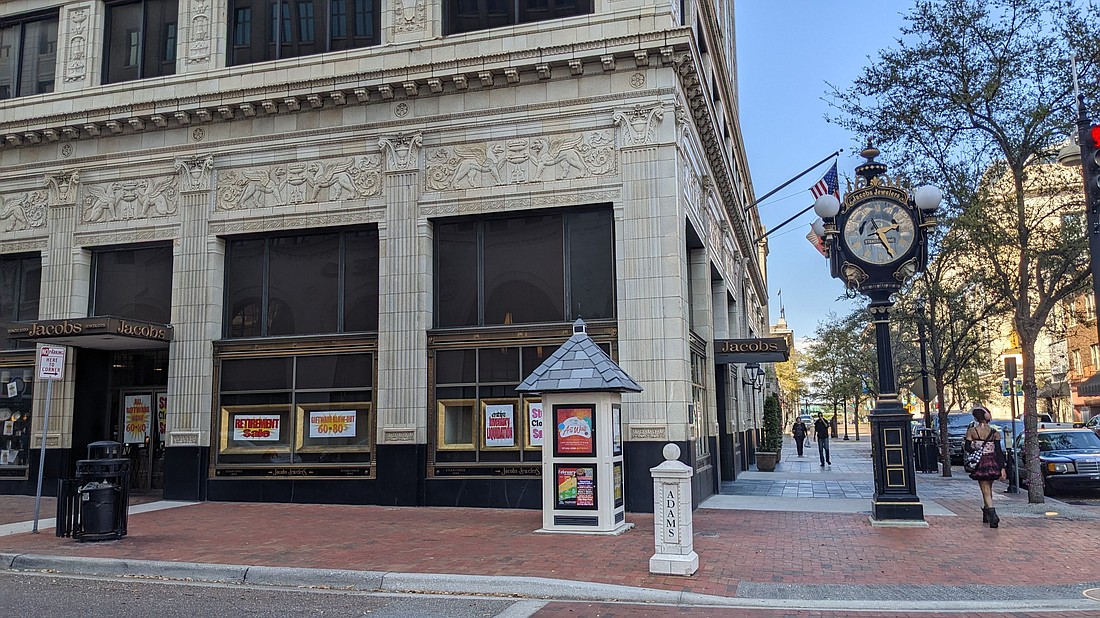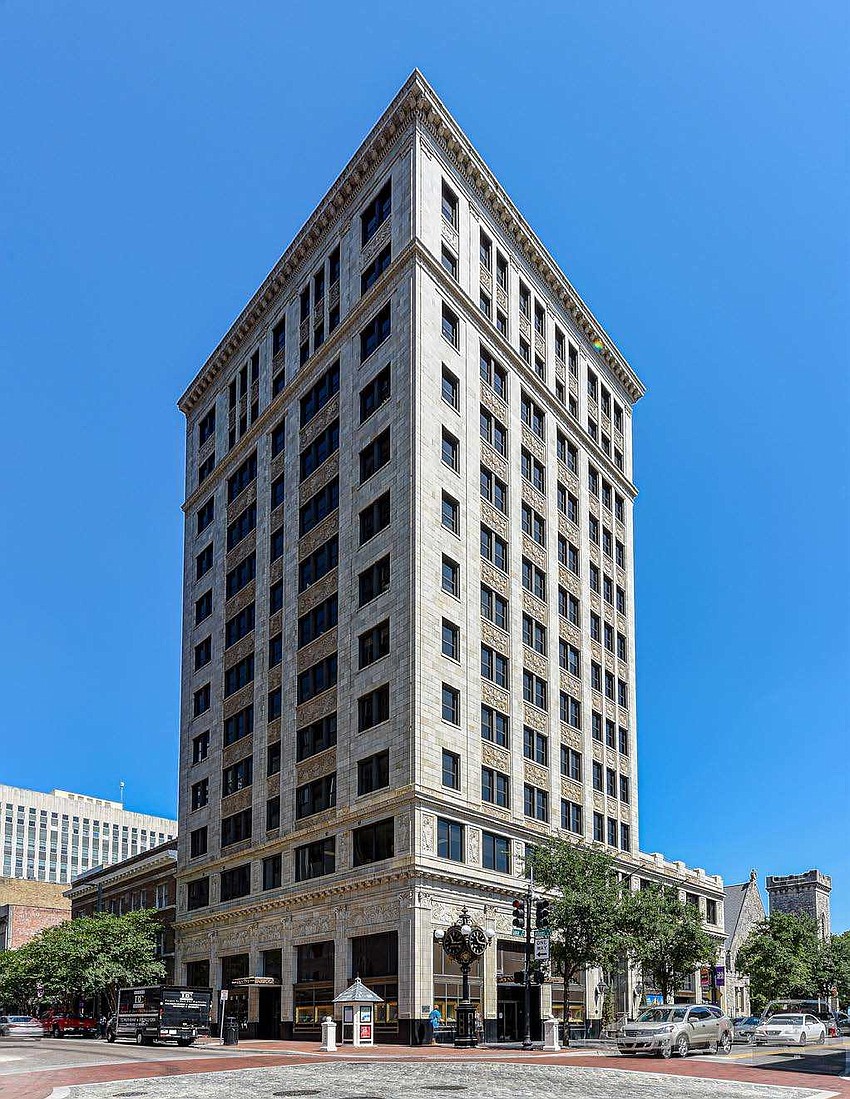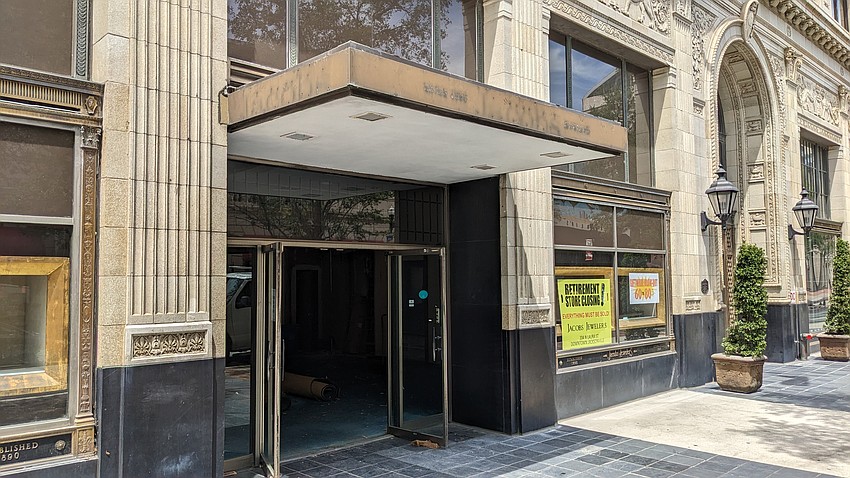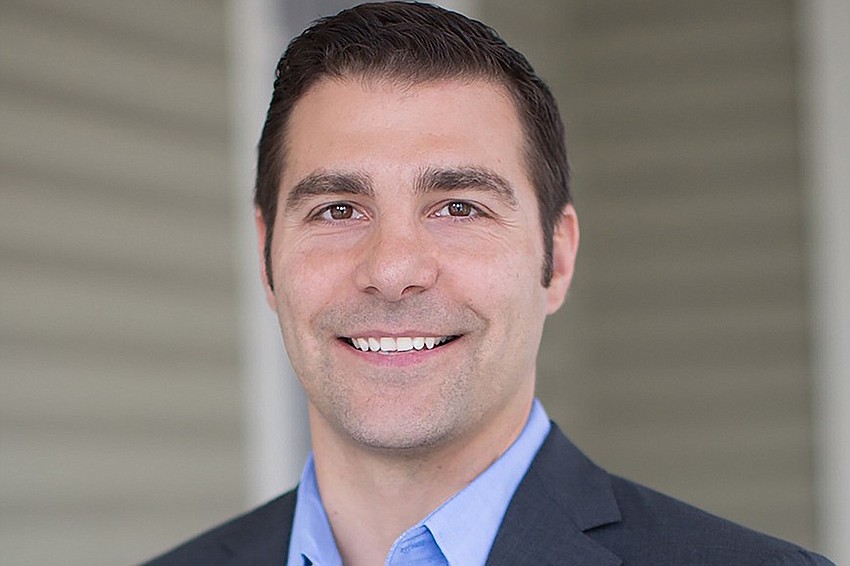
The Jacksonville Historic Preservation Commission voted July 26 to designate the 96-year-old Greenleaf & Crosby Building Downtown as a Jacksonville landmark.
The building is at 208 N. Laura St., at Laura and Adams streets.
Agreeing with the Jacksonville Planning and Development Department’s recommendation to approve the designation, the commission voted 5-0 to add the structure to the Downtown National Register.
“Thank you to the staff for putting this together. Obviously, if we’re not landmarking something like this in town, what are we even doing here?” said commission member Julia Epstein, a project architect with Dasher Hurst Architects.
Jacobs Jewelers recently closed on the street level as its owners retired.
Property owner JWB Real Estate Capital LLC, led by Downtown investor Alex Sifakis, sought the status.
The consultant is Atlanta-based Ray, Ellis & LaBrie Consulting, which focuses on preservation and tax incentives. The firm is assisting owners with applications for the landmark designation and for the federal historic rehabilitation tax credit.

Historical information accompanying the application says the structure was built in 1927 by the Marsh & Saxelbye architectural firm.
The interior was significantly altered about 1964 to modernize the building. The first four floors of the 12-story structure were renovated in 1985, and the third-floor atrium was extended to the top floor of the building, “creating a window wall across from the existing elevator bank.”
The application says Damon Greenleaf came to Jacksonville in 1867 from New York and established a jewelry store on Bay Street. J.H. Crosby joined him in 1880 to create Greenleaf & Crosby Co.
After the Great Fire of 1901 destroyed the original building, they moved to another Bay Street location.
By 1926, they “had joined the speculative frenzy of the Florida Land Boom and were planning a six story building,” the application says.
Instead, the building was developed in two sections – a two-story base and a 10-story tower.
It has been used as an office building with a ground-floor jewelry store.
Greenleaf and Crosby sold their business in 1930 to V.E. Jacobs, who changed the name to Jacobs Jewelers. Roy and Delorise Thomas bought it in 1986 and retired in 2023.

It changed ownership in 2023 and will undergo “a substantial rehabilitation … to update mechanical systems and retain historic architectural features that make this building one of the finest in the downtown Historic District,” according to the application.
The statement of significance shows the property met five of seven criteria used to determine landmark status:
• Its value as a significant reminder of the cultural, historical, architectural, or archaeological heritage of the city, state or nation.
• It is identified as the work of a master builder, designer or architect, whose individual work has influenced the development of the city, state or nation.
• Its value as a building is recognized for the quality of its architecture, and it retains sufficient elements showing its architectural significance.
• It has distinguishing characteristics of an architectural style valuable for the study of a period, method of construction, or use of indigenous materials.
• Its suitability for preservation or restoration.
The commission’s recommendation to landmark the building will head to City Council, which has the final say on historic designations.
The local landmark designation could make certain renovations for historic restoration and code compliance eligible for forgivable loans and deferred principal loans through the city Downtown Investment Authority’s Downtown Preservation and Revitalization Program.

Sifakis said July 27 that JWB is working with DIA on an incentives application through that program to partially finance what he called a “pretty large” renovation.
According to Sifakis, JWB has not finalized the project cost.
JWB intends to relocate its headquarters to fill a majority of the vacant office space in the Greenleaf building when the renovations are complete and the company is not marketing the vacant commercial office space, Sifakis said.
JWB will not move from its Philips Highway based until the renovations are complete, he said.
According to the landmark designation application, the building is about 50% leased.
Sifakis said JWB intends to lease the former Jacobs space to a “high-end, full-service” food and beverage operator. The company does not have a lease signed, but Sifakis said JWB has had “great response” from operators outside the Jacksonville market.
Businesses like restaurants, bars and coffee shops are eligible for additional city financial incentives for interior build-out from the DIA’s Food and Beverage Retail Enhancement Program. Sifakis said it’s possible that JWB and a future tenant pursues city dollars from the program.
JWB has a history of seeking city incentives for its Downtown projects.
DIA and Council awarded the developer $8.62 million in forgivable and deferred principal loans in June 2021 for its mixed-use residential and retail renovation of the historic Florida Baptist Convention and Federal Reserve buildings near City Hall.
The city approved $669,000 in incentives in February 2022 for the company’s Porter House Mansion project Downtown.
JWB’s joint, 91-unit for-sale town home project with Corner Lot Development Group, currently under construction, relied on a city agreement to convey a $3.58 million parcel of land in LaVilla in exchange for a price ceiling on the homes and a contribution from the developers to build the adjacent Lift Ev’ry Voice and Sing Park.